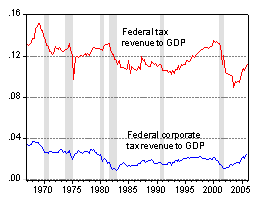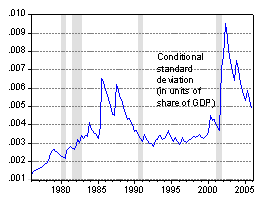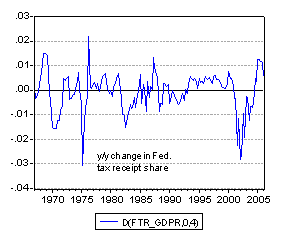There has been much talk about how the deficit problem has been licked, as tax receipts surge. Is (Lafferian) supply-side economics right? Are we in a new era of surging tax receipts for the forseeable future? The short answers are “no” and “no”.
In several news reports, the surge in tax receipts has been forwarded as remarkable. (See quotes of the President here). But it is important to note, as mentioned in one article, that tax receipts have become increasingly volatile in recent years. Figure 1 shows a graph of total tax revenues and corporate tax revenues as a share of U.S. GDP. One thing that is apparent is the large shifts in receipts in recent years.

Figure 1: Total Federal tax revenues and corporate tax revenues (ex. Federal Reserve System), normalized by GDP. Source: BEA, June 29 NIPA release, and author’s calculations.
To examine more formally whether the recent tax receipt surge is something that is out of the ordinary, given previous statistical tendencies, I estimate an GARCH model for total tax receipts to GDP for the 1976q1-06q1 period. The primary equation includes a lagged variable and a trend term. The secondary equation for conditional heteroskedasticity is one that allows for an GARCH(1,1) process. I plot the conditional standard deviation in Figure 2.

Figure 2: Conditional standard deviation of total Federal tax revenues to GDP. Source: author’s calculations.
This graph indicates that the volatility (measured by autoregressive conditional heteroskedasticity) has indeed risen in recent years. What to make of the surge in tax receipts? Using the autoregressive specification, one finds that the 2006q1 underestimate was 0.0035 — much less than the conditional standard deviation of 0.006. This suggests to me that the surges are not statistically significant.
One might argue that the problem is with my model of tax receipts to GDP. I also checked to see if regressing this variable on a cyclical factor (namely a deviation of the log real GDP from the HP-filtered series as a proxy for the business cycle), along with a lagged dependent variable yielded a different result. Qualitatitvely, the results are the same. The underprediction is 0.002 in 2006q1, with the corresponding conditional standard deviation at 0.004. (It is relatively easy to obtain a similar specification that says that 2006q1 receipts to GDP are below where they should be.) Hence, I conclude it’s too early to break out the champagne.
Additional point: the 2005 surge is partly a consequence of the Homeland Reinvestment Act, which reduced the statutory corporate tax rate on repatriated earnings from 35% to 3.5%. This is a one
shot effect. So I wonder about the persistence of this surge.
Additional point 2: As I watch the President, I am reminded that none of these developments change the long term prognosis for the budget deficit. If entitlement spending (including the massive entitlement spending increase pushed by the Bush Administration, entitled Medicare D) continue as is, the 2001 and 2003 tax cuts made permanent (and not just extended to FY2010), and discretionary spending grows more in line with historical norms (and even if less than the rate of growth during the past six years), then the deficit will expand as a share of GDP in the out years.
Late addition for post below:

Figure 3: Year on year change in percentage point share of Federal tax receipts in GDP. Source: BEA, June 29 NIPA release, and author’s calculations.
Technorati Tags: budget deficits,
tax receipts,
corporate tax receipts, ARCH
and
tax cuts
You haven’t addressed the pertinent issue (although thanks for measuring as a % of GDP). The larger issue is that receipts have increased, and now are at average, historical levels as a % of GDP, despite the fact that rates are lower and credits/deductions are more available. Yes, the AJCA repatriation provision resulted in more receipts recently, but that’s a minor effect ($ 2.7 billion according to JCT http://www.house.gov/jct/x-69-04.pdf)
Receipts are larger than forecasted despite the tax cuts. That’s news to celebrate.
The long-term picture is of course poor — but’s that a function of spending, not a fault of tax policy.
on a more basic level, wouldn’t you agree that an 11% gain in taxes in F06 is remarkable? How many years in the last 100 have tax revenues grown faster? How many other economies in the world are producing 3.5% growth and 11% growth in tax receipts? Why don’t people ask how long the government can keep growing 3-4 X faster than the underlying economy?
RD. Your logic reminds me of a Los Angeles weather man who upon seeing the temperature hit 100 degrees, freaks out and declares his forecast for tomorrow’s high to be 105. So now that the temperature is only 97 degrees, he goes out and buys a heavy overcoat. Of course, revenues rise during recoveries from recession. And this White House has gamed deficit forecasts so we are almost guaranteed to beat expectations.
While BEA uses calendar years – not fiscal years, consider the following % increases in Federal receipts:
1977: 12.7%
1978: 16.5%
1979: 14.8%
You might protest that: (a) we were recovering from the Ford recession; and (b) these are nominal increases when the inflation rate was above zero. But the same holds for your 11% – I think.
RD:Please refer to figure 1 — we are not back to historical averages, unless we use a judicious selection of a reference period. Yes, receipts are above what were projected, but it was also widely acknowledged that the original Administration budget included less optimistic revenue and spending projections so that the budget numbers at mid-session would look “surprisingly” better. That’s how the game is played.
RD and david: Yes, there was some surprise on the upside in tax receipts. But the point of the post is that the volatility is now much higher than in the 1990s, so the “remarkability” of this event is actually, in a statistical sense, small.
Finally, take a look at the year-on-year change in the percentage share of tax receipts to GDP, which I’ve added to the original post as “Figure 3”. Big surge (declining in 2006q1) while this is making up for big declines in 2001-04 — so let’s not forget where we are depends upon where we started.
I believe that there was a change in tax regimes for foreign investments by US corporations that made it advantageous for the affected corporations to repatriate capital in a short period. Although this would be a tax event it would be a saving overall so that for one year tax revenues and capital flows wwould be boosted. Is this a figment of my imagination? If not, when were the effects felt?
“Additional point: the 2005 surge is partly a consequence of the Homeland Reinvestment Act, which reduced the statutory corporate tax rate on repatriated earnings from 35% to 3.5%. This is a one shot effect. So I wonder about the persistence of this surge.”
Correct me if I am wrong, but the one-off repatriation does have a multiplier effect on future tax receipts, if those funds are re-invested in income producing assets within the USA versus perpetually earning untaxed receipts outside of the USA or not? Thanks.
As you note, it looks in Fig 1 like a lot of the “surge” has been due to corp taxes, whose tax rate has not changed (except for the temporary amnesty, while corp profits as % GDP have risen to historic highs). It would be interesting to add to fig 1 the path of personal income tax revenues, to see how much they have recovered relative to GDP
The gaming of the estimates is nonsense. We are discussing tax receipts here, not deficit forecasts.
Menzie – Do you really believe that the Bush admin has influence over the economists in the Office of Tax Analysis at Treasury? (They produce the tax receipts numbers, not OMB as has been reported).
Moreover, throw away the executive branch numbers if you like. Do you think the Bush admin has influenced the estimates put out by CBO and JCT? That’s ridiculous.
And pgl — those economists (the estimators, as they are called) include business cycle effects.
It is a fact that receipts are higher than forecasted – and those forecasts included the predicted effects of all tax policy changes. Even if a small effect, it calls for an analysis of the differing effects of the 2001 and 2003 tax cuts.
Nonetheless, the increase in volatility is interesting, as the graphs here illustrate.
Greg Mankiw on this topic:
http://gregmankiw.blogspot.com/2006/07/what-to-make-of-revenue-surprises.html
To be fair, his take is closer to Menzie than my own.
RD: I’m glad you found the volatity graphs interesting. I think they highlight the fact that the surge needs to be viewed in a statistical context.
Thanks too for the link to Mankiw’s post.
I agree that the actual receipts are above the forecasts, and that includes the forecasts from the CBO, which I consider independent from the Administration. I have no independent information on JCT.
You ask me a loaded question: do I really believe the Bush Admin has influence over the economists at OTA. Without wishing to impugn the dedicated career civil servants in the Federal government — and I have almost always been very impressed with the career staff — I gotta ask you if you’re kidding. When I think of WMD cherry picking, suppression of views of career scientists at USFWS and NASA, the muzzling of the actuary in the runup to enacting Medicare Part D, my mind reels.
Parting shot: I served on Executive Office of the President staff from June 2000 to June 2001. I will only say that I can imagine at least indirect pressure being exerted.
Parting shot:
The OTA estimates were not gamed. Even hinting that they were is deeply insulting to those tax economists who do the analysis. I can’t speak intelligently about expenditure forecasts (with emergency war appropriations and the like), but we are discussing receipts.
And by the way –
40-year average of tax receipts as % of GDP = 18.2%.
Estimated 2006 tax receipts as % of GDP = 18.3%.
This despite lower rates.
Despite the disagreement on tax economics, I find the site great reading. Thanks.
RD: As I indicated (with italics) in my previous comment, I have the greatest respect for the career civil servants in the professional staff. What I wonder about is what happens when information gets to the policy level (the Assistant Secretary and the Secretary). The Assistant Secretary for Tax Policy position has been vacant for some time, so I guess the question is about what happens when the information gets to the Secretary. And then I remember reading that John Snow couldn’t recall what the latest inflation rate had been, when testifying at a Congressional hearing (and apparently did not realize that it would be useful to know the difference between nominal and real wage growth), so…
I still wonder why no one comments on revenue compared to spending. It seems to me irrelevant that revenue is more than forcast when it is still way below spending. The forcasts from the CBO (more closely related to actualality than the OMB offerings) show a deficit in the long term and at least in my household, such a long term shortage leads to unpleasant consequences.